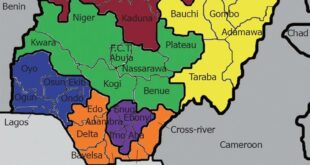By Olori Magege,

When Coronavirus emerged in China as the cause of the deadly illness COVID 19 government agencies in charge of dissemination of information for orientation failed to rise to the occasion by adopting wrong strategies. It is very important that the general public is effectively mobilized through simple messages they can understand and relate to.
I have watched videos of market women struggling to pronounce Coronavirus. The tongue-twisting name bears no semblance to anything they can relate to, so the general understanding of the illness is bound to be poor, very poor.
But COVID 19 is novel not in its newness but in the severity of its symptoms and its deadliness. Stripped bare COVID 19 is the common catarrh albeit a deadly and severe variant of catarrh.
If a member of a household gets catarrh, shortly nearly everyone in the household will be infected. If a pupil in a class is infected, a few days later nearly all the pupils in the class will have a running nose.
When a family member starts sneezing and coughing people move away from him, and if it is in s market or any public place people cover their faces with handkerchief and move away from that space.
It is also common knowledge that when people blow their nose they clean their nose with a handkerchief or on their sleeves or wrapper. The unwashed hands become an agent of infection of others. So the manifestation of catarrh and its control and containment is known to every Nigerian. Every Nigerian gets infected with catarrh several times a year, and some can be severe in some cases as to require hospitalization.
So in explaining the COVID 19 to the Nigerian public, the government would have drawn on the relationship and similarity it has with common catarrh. That would have enhanced public buy-in and easy understanding.
We all practise social distancing in control of catarrh, it is not new. We also avoid shaking hands with one infected with catarrh.
So what government ought to have done is to domesticate the name by branding it Devil Cattarh. Catarrh, as I said, is not new in Nigeria and to Nigerians. And the devil branding to catarrh is very effective in instilling the required fear of the illness in the populace. Devil has been used to beat faith adherents of religions into shape. The devil represents everything evil, death, human pains and sufferings here on Earth and even in life after in burning hell. Branding COVID 19 as Devil Cattarh certainly will enhance understanding of the illness by the public as a very deadly one that must be kept at bay.
At state and local government, Devil catarrh should further be translated to the indigenous language for proper understanding at the grassroot. For instance in Urhobo catarrh is named ovwonri. Every Urhobo speaking person knows it and had suffered bouts of it several times every year of his life. He also knows that the devil the monster is called idebono or esu. So when he hears an illness called ovwonri r’esu, he instantly knows that it is a deadly respiratory illness having the characteristics of catarrh: sneezing, coughing, running nose, highly infectious. He is also familiar with how to contain it. The job of the orientation agencies will be made easy and message effectiveness is instantly optimized. Public buy-in is total in such situation thus ensuring the full acceptance and compliance with government directives to curb the spread of the illness.
An understanding of the illness will also spur local efforts at seeking indigenous herbs to cure the illness because the local has been treating catarrh for ages. Governor Makinde alluded to this in his post quarantine speech where he advocated for a homegrown solution to the Devil Cattarh.
It is my hope that this my write will spur an effective local solution to COVID 19 the Devil catarrh.
Chief Olori Magege, is a former SSA to Delta State governor on Social Advocacy
Subscribe to the Advocate News letter and receive news updates daily in your inbox.
 Advocate.ng Latest news update on politics, entertainment, sport and more
Advocate.ng Latest news update on politics, entertainment, sport and more



